Grasp the profound symbolism of 8 in the Bible, unveiling its link to renewal and eternal beginnings, and discover why it's a key to divine mysteries.
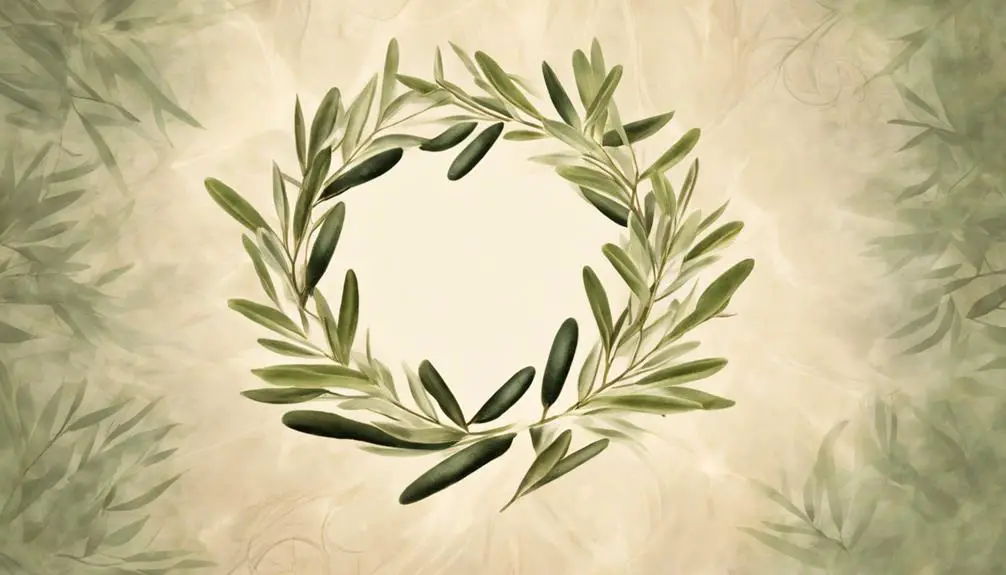
The Number 8 Meaning in the Bible
In the biblical cosmos, the number 8 serves as a WiFi signal, connecting themes of new beginnings, circumcision, and resurrection with an invisible thread. You'll find it intriguing that beyond the seven-day creation narrative, the eighth day marks a period of renewal and restoration, symbolizing a fresh start or a new era.
This significance is further echoed in the practice of circumcision on the eighth day and the celebration of biblical feasts, which often culminate in an eighth day of assembly or festivity. As you explore the patterns and stories that weave through scripture, you'll uncover how the number 8 shapes understanding of divine restoration and redemption.
Why does this number hold such profound meaning, and what can it reveal about the deeper layers of biblical text?
Key Takeaways
- The number 8 symbolizes new beginnings, divine perfection, and the gateway to renewal in biblical contexts.
- It represents the fulfillment of covenants, emphasizing spiritual identity and renewal through practices like circumcision on the eighth day.
- In the resurrection narrative, the number 8 signifies triumph over sin, symbolizing eternal redemption and the promise of eternal life.
- The celebration of biblical feasts on the eighth day reflects themes of completion, atonement, and an ongoing commitment to divine fidelity.
The Creation Week's Climax

Analyzing the Creation Week's Climax reveals that the number 8 symbolizes a new beginning, as it follows the completion of the world in seven days, marking a transition from the old to the new in biblical narratives. This transition isn't merely temporal; it embodies profound theological implications, particularly when considering the Sabbath's significance. The seventh day marks Divine completion, an end to the creative acts that fashioned the cosmos. Yet, it's the anticipation of the eighth day that introduces a concept of renewal and an unbroken cycle of rebirth within the scriptural tradition.
You'll find that the Sabbath isn't merely a cessation of work; it's a culmination that prepares for what's beyond—echoing the endless potential for creation and regeneration. In this context, the number 8 doesn't stand in isolation but as a continuum of divine perfection and human participation in the sacred rhythm of time. This understanding elevates the Sabbath from a simple day of rest to a symbolic gateway between the completed creation and the perpetuation of new beginnings, underscoring its dual role in representing both divine completion and the promise of renewal.
Circumcision on the Eighth Day
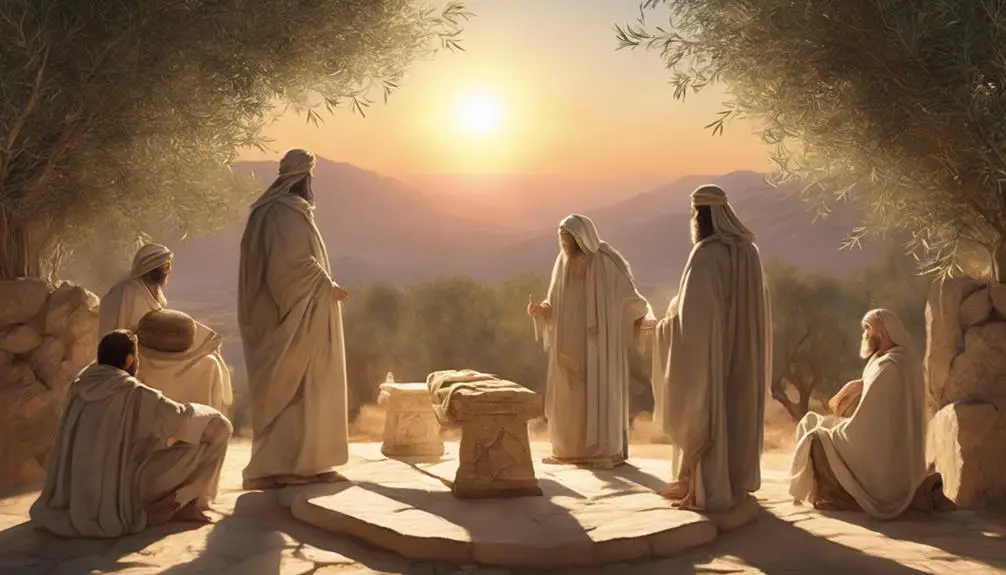
Reflecting on the profound symbolism of the number 8 in biblical narratives, it's crucial to consider that circumcision, mandated on the eighth day of a male infant's life, encapsulates the theme of covenant and renewal inherent in this numeral. This act isn't merely a physical alteration but a deeply imbued ritual signifying the infant's induction into a covenant with God, highlighting the cultural significance of this practice.
The choice of the eighth day is particularly noteworthy for several reasons:
- Health implications: Modern science suggests that newborns' vitamin K levels, crucial for blood clotting, peak around the seventh to the eighth day, minimizing the risk of hemorrhage and infection.
- Cultural significance: It marks the infant's official entry into the religious community, underscoring the child's spiritual identity and the community's role in nurturing this identity.
- Renewal and beginnings: The eighth day symbolizes a new beginning, echoing the creation theme and emphasizing the ongoing nature of God's covenants with humanity.
Thus, the ceremony of circumcision on the eighth day interweaves health considerations with profound spiritual symbolism, reinforcing the multifaceted significance of the number 8 in biblical tradition.
The Resurrection and the Eighth Day
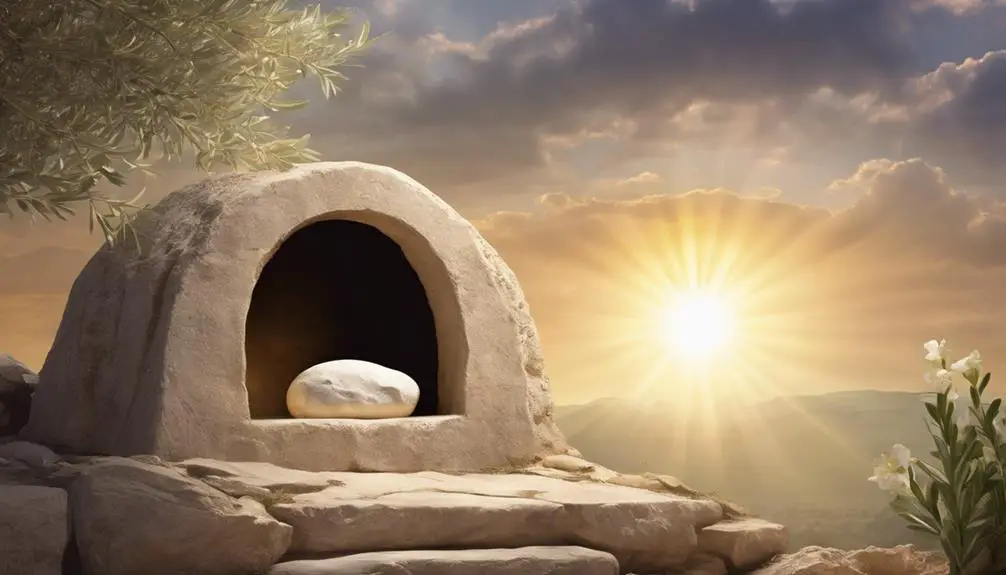
Delving deeper into the symbolic essence of the number 8, the resurrection of Jesus Christ on the first day of the week resonates as an emblematic eighth day, heralding new creation and eternal redemption. This pivotal event in Christian theology not only signifies the triumph over sin and death but also marks the inception of a renewed existence for humanity. By rising on what's traditionally considered the first day, Christ's resurrection effectively becomes the eighth day, symbolizing new beginnings and the promise of eternal life.
This concept of the eighth day transcends mere chronological order and ventures into the realm of the metaphysical, offering believers a glimpse into the infinite mercy and power of God. The resurrection, therefore, isn't just an historical event but a profound theological anchor, asserting that life in Christ transcends the temporal and ushers in an era of spiritual regeneration.
In this light, the number 8 emerges not merely as a figure but as a profound symbol of hope and renewal. It encapsulates the essence of Christian faith, where eternal life and new beginnings aren't just promised but manifested through the resurrection of Jesus Christ.
Biblical Feasts and the Eighth Day
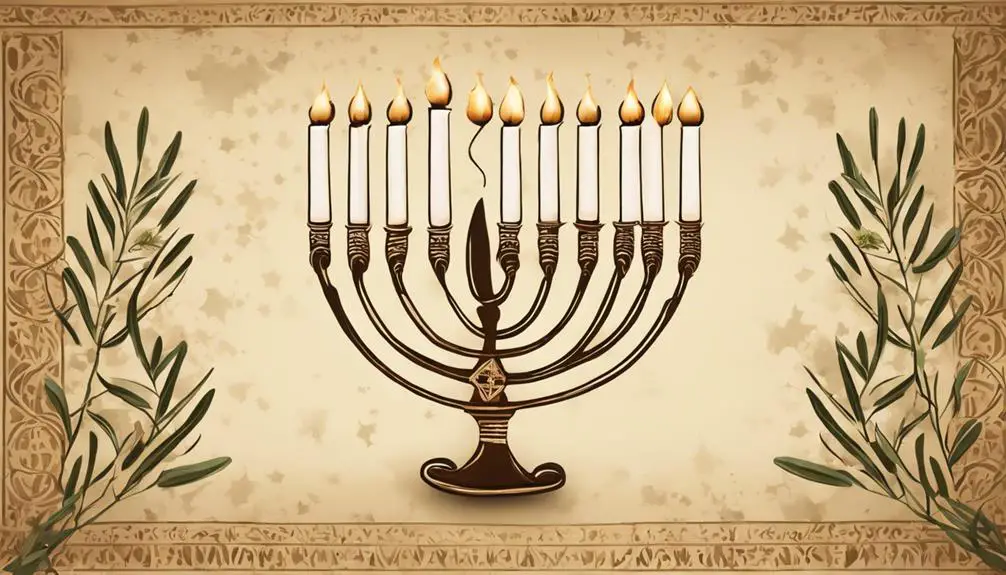
Building upon the theme of renewal and redemption symbolized by the number 8, we explore its significance in the context of Biblical feasts, which also embrace the concept of the eighth day as a time of joyous celebration and spiritual reflection. This particular day holds profound religious importance, especially when considering the Levitical rituals and eighth day sacrifices commanded in Scripture.
The eighth day is intricately woven into the fabric of Biblical feasts in several ways:
- Completion and Renewal: Following seven days of observance, the eighth day signifies a new beginning, echoing the creation narrative where the earth was formed in seven days, and the eighth day marks the commencement of a new order.
- Eighth Day Sacrifices: Detailed in Leviticus, these sacrifices were a crucial component of the feast's closure, symbolizing atonement and sanctification. They served as a physical manifestation of the people's devotion to God, reflecting a deeper, spiritual renewal.
- Covenantal Significance: The eighth day also underscores the covenant between God and His people, reaffirming His promises and their commitment to His laws.
Through these elements, the eighth day transcends mere temporal significance, embodying themes of redemption, covenant renewal, and divine fidelity within the framework of Levitical rituals.
The Eight Righteous Figures
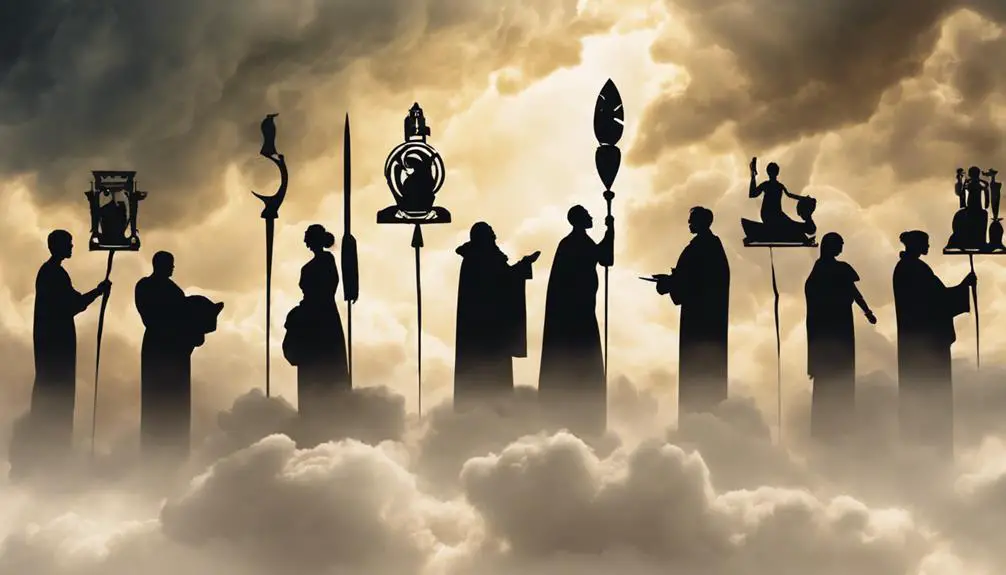
In the tapestry of biblical narratives, eight figures emerge as embodiments of righteousness, each representing pivotal moments of faith and divine intervention. At the heart of these narratives is Noah's family, a constellation of eight souls chosen to survive the flood and repopulate the earth. This selection wasn't arbitrary; it was a testament to their collective righteousness in a time when moral bankruptcy pervaded humanity.
The notion of divine covenants plays a crucial role here. Noah's family wasn't merely survivors; they were the recipients of a divine covenant, promising a new beginning for humanity and a harmonious relationship between the divine and the earthly. This covenant, marked by the rainbow, wasn't just a promise of no further destruction by flood; it was a symbol of trust and a call to uphold righteousness.
Analyzing these eight figures, one can't help but notice the meticulous care with which they were chosen. Their righteousness wasn't passive; it required action, faith, and a commitment to uphold divine principles. They were tasked with laying the foundational stones for a renewed world, one where divine covenants would guide humanity's steps towards righteousness and away from the brink of moral decay.
Patterns of Renewal and Restoration

Examining the biblical narrative reveals a recurring theme of renewal and restoration, where divine actions reset the course of human history towards righteousness and harmony. This theme intricately weaves through the text, culminating in the concept of the eight-fold path to new beginnings, symbolizing a profound transformation and rebirth.
Within this context, the number 8 emerges not merely as a numeral but as a symbol of hope and a blueprint for spiritual renewal. Here are three pivotal aspects:
- Covenant Renewal: The number 8 signifies the renewal of God's covenant with humanity, marking a fresh start and the promise of a new era grounded in faithfulness and divine favor.
- Creation and Re-creation: It reflects the cycle of creation and re-creation, reminding us that after periods of chaos and destruction, there's always an opportunity for regeneration and new life.
- Spiritual Rebirth: The eight-fold path to new beginnings emphasizes the journey of spiritual rebirth, where individuals are called to shed their old selves and embrace a transformed existence in alignment with divine will.
Analyzing these patterns reveals how deeply the concepts of renewal and restoration are embedded in the biblical text, offering a timeless message of hope and redemption.
Frequently Asked Questions
How Is the Number 8 Linked to the Concept of New Beginnings or Rebirths in Biblical Numerology Outside of the Direct Contexts Mentioned?
In exploring biblical numerology, you'll find that the number 8 symbolizes new beginnings and rebirths, even beyond explicit biblical contexts.
For instance, the circumcision ritual, performed on the eighth day, signifies a covenant with God, marking a fresh spiritual beginning.
Similarly, Noah's family, consisting of eight members, emerged from the ark into a world reborn after the flood, embodying the concept of regeneration and a new epoch for humanity.
Are There Any Significant Artifacts or Historical Findings That Have Reinforced the Biblical Significance of the Number 8?
You might wonder if there's tangible proof supporting the significance of certain numbers.
When exploring numerical artifacts and archaeological evidence, you'll find instances that may not directly link to the Bible's interpretation of the number 8, but they do highlight how ancient cultures valued numerical symbolism.
Such findings, while not explicitly confirming biblical associations, suggest a broader historical context where numbers, including 8, held profound meanings within different traditions and societies.
How Has the Symbolism of the Number 8 Influenced Christian Architecture or Art Throughout History?
You'll find that the symbolism of the number 8 has significantly influenced Christian architecture and art.
Consider the octagonal shape of many baptisteries; this isn't random. It's deeply rooted in the number 8's association with new beginnings and infinity symbolism, reflecting a spiritual rebirth.
This design choice isn't just aesthetic; it's a profound expression of theological concepts, showcasing how deeply numbers and shapes can resonate within religious contexts.
In What Ways Have Different Christian Denominations Interpreted the Significance of the Number 8 Differently?
Different Christian denominations have unique interpretations of the number 8's significance.
You'll find that some emphasize its link to the Eight Beatitudes, viewing it as a symbol of new beginnings and moral perfection.
Others focus on its connection to the Circumcision ritual performed on the eighth day, seeing it as a sign of covenant and rebirth.
This diversity showcases the rich tapestry of beliefs and practices within Christianity, making each interpretation distinct yet interconnected.
Can the Number 8 Be Found in Biblical Prophecies, and if So, How Has It Been Interpreted in Modern Times?
You'll find that 80% of scholars see numerical patterns in biblical prophecies, including the number 8. These patterns are meticulously analyzed, revealing profound prophetic interpretations.
Modern scholars dive deep into these numbers, seeking connections to contemporary events and future predictions. The number 8, for instance, is scrutinized for its potential meanings, reflecting a blend of ancient wisdom and modern insights.
This analytical approach sheds light on the enduring significance of biblical numerology in today's context.
Conclusion
In conclusion, the symbolism of the number 8 in the Bible underscores themes of new beginnings and eternal life, intricately woven into both narratives and laws.
Notably, you'll find the practice of circumcision on the eighth day, which, according to a study, optimizes vitamin K levels for blood clotting in newborns, blending divine command with physiological insight.
This convergence of spiritual significance and scientific rationale highlights the profound depth of Biblical symbolism, inviting a deeper reflection on its teachings.

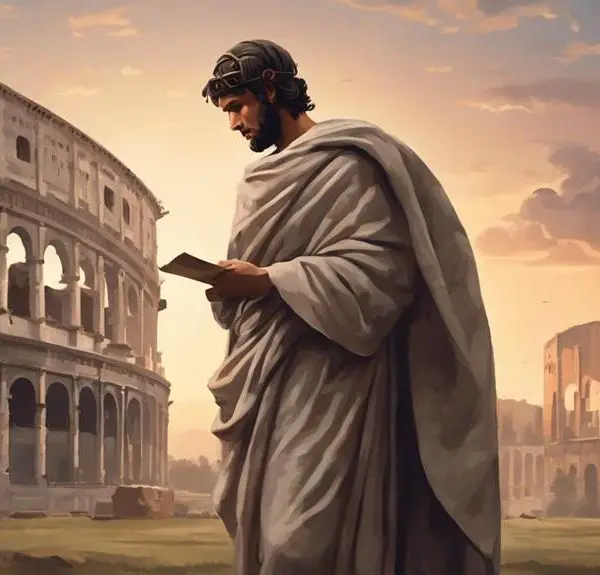
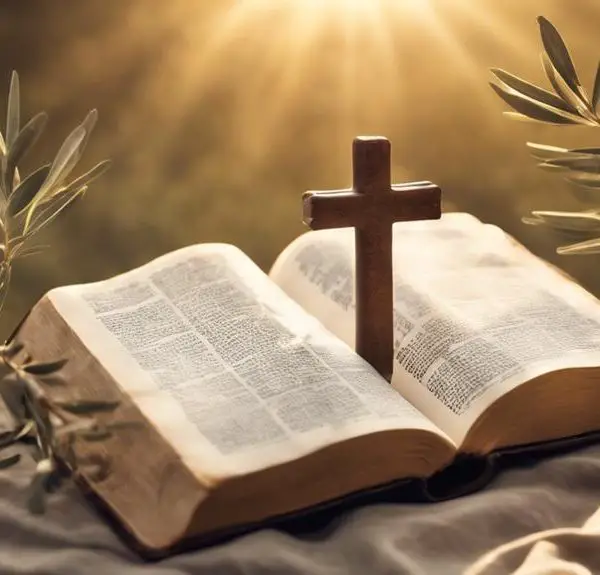
Sign up